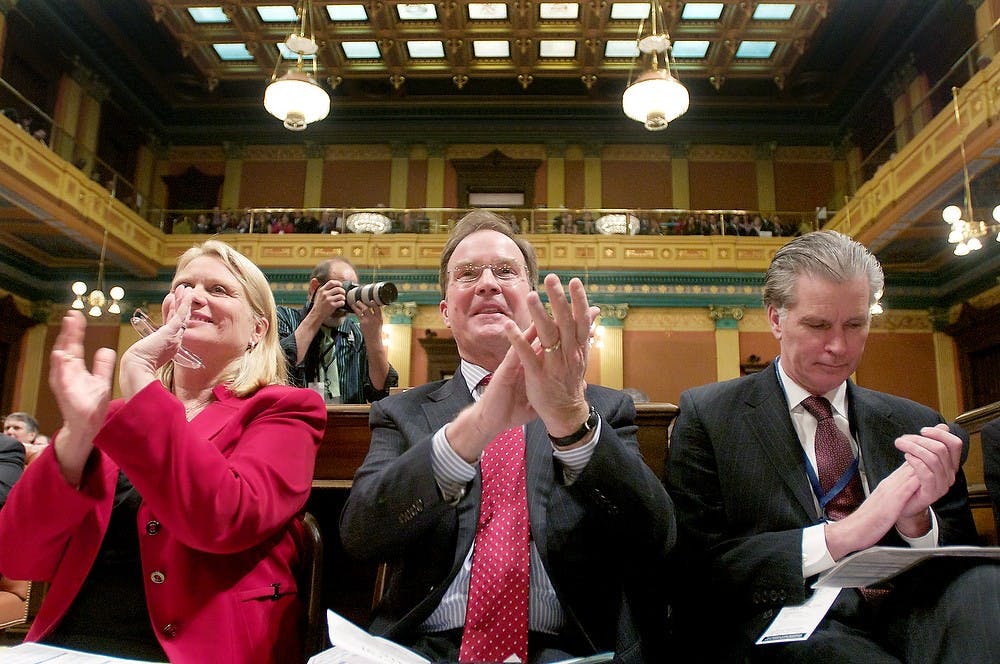But as he ran down a list of accomplishments from the past year, he also looked toward the future workforce of the mitten — students.
“Our goal is to continue to keep the young people in this state, and we’re going to continue to work hard,” Snyder said.
Snyder and MSU
Despite his Wolverine background, Snyder has spent his share of time at MSU enacting programs that affect the Spartan community.
In December, Snyder donned a robe and addressed seniors at their graduation ceremony, asking them to stay and find a career in Michigan.
Last year, Snyder increased MSU’s funding by 1.4 percent — an upward trend economics professor Charles Ballard hopes will continue.
“I’m cautiously optimistic that we’ve hit bottom and, now that our economy is growing, perhaps that will free up some funds,” he said.
Wednesday night, the governor presented plans to focus on state university graduates in March and establish a system to create jobs through the educational system in April.
But MSU College Democrats president Stephen Wooden said the governor also attacked higher education earlier in the year. In February 2012, Snyder’s budget proposal cut 15 percent of funding for higher education.
“He de-invested in education and because of that, we are still scrambling to make education affordable,” Wooden said.
In late November, Snyder visited MSU’s W.K. Kellogg Biological Station — a research field station near Kalamazoo, Mich., — to announce plans to invest more in research institutions. He emphasized energy efficiency and said Michigan lawmakers need to buckle down to develop a long-term energy plan in 2013.
Snyder reaffirmed the importance of environmentally friendly energy, an effort MSU has been working toward through its Energy Transition Plan, which aims to run the university on 40 percent renewable energy by 2030.
Fred Poston, dean of the College of Agriculture and Natural Resources and former vice president of finance and operations, listened to Snyder’s promises throughout the evening.
“What I really liked about the governor’s speech was it was comprehensive,” Poston said. “He was clearly a big-picture thinker, and he was looking at solving the system’s problem there.”
The long road ahead
The central focus of Snyder’s speech was repairing Michigan roads, bridges and harbors. The more than $1 billion in construction will be paid for through a gas tax he referred to as a “user tax,” because Michigan residents use roads throughout the state.
“We need to invest more in our roads,” he said. “To put it in simple sense: it’s time.”
Ballard also applauded the governor’s efforts to construct a new bridge over the Detroit River.
Support student media!
Please consider donating to The State News and help fund the future of journalism.
“We’re moving forward with the new international trade crossing,” Snyder said.
Snyder said the average car repairs for Michigan are $81 more per vehicle than the surrounding states because of the state’s poor road conditions.
University engineer Bob Nestle said although this will not affect MSU directly, as the university pays for its own construction projects, it could mean more funding for roads surrounding the campus.
In March, Grand River Avenue and Michigan Avenue will receive some improvements, including roadway resurfacing, an 8-foot-wide sidewalk added to both sides of Grand River Avenue and an additional three Michigan-left turns on Michigan Avenue.
“That becomes the governor’s challenge I think — to convince people of the state that it’s their tax dollars and more of it needs to be spent on roads,” Nestle said.
However, Director of MSU’s Institute for Public Policy and Social Research Douglas Roberts said residents might be convinced to spend the money for something that will impact their lives everyday — the roads they drive on.
“I’m convinced that it’s going to be a tough vote, but on the other hand, I think it will ultimately pass,” Roberts said.
Next on his plate
As Snyder detailed his plans for 2013, he detailed a laundry-list of projects he hopes to begin this year.
He mentioned helping K-12 programs, veterans and retired Michigan residents. He asked legislators to work on lowering Michigan auto insurance by reforming no-fault insurance and creating an authority to prevent insurance fraud. He said Michigan should work on mental health by investing in partnerships and more resources, such as those offered at MSU through the Counseling Center.
“We should be doing more to help people before they show up before a judge,” he said.
But some outside the Capitol still were focused on Snyder’s track record for 2012.
While Snyder gave his speech, about 100 gathered outside the building to protest right-to-work legislation.
He briefly mentioned the uneasiness caused by a right-to-work bill passed during December’s lame duck decision, which made unions optional for employees.
“I hope we can work together … to avoid those types of situations, but ultimately we’re hired by the citizens and the people of the state of Michigan and our role and responsibility is to give them the best customer service,” he said.
Looking ahead in May, Michigan lawmakers will report on the mitten’s land and in June, Snyder will look at ways to preserve the Great Lakes.
“Enough talk for tonight, let’s go to work tomorrow,” he said. “Let’s reinvent Michigan.”
Discussion
Share and discuss “Snyder to Michigan: "It's time."” on social media.







